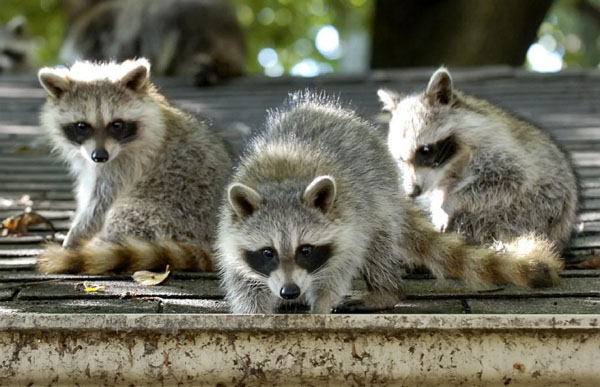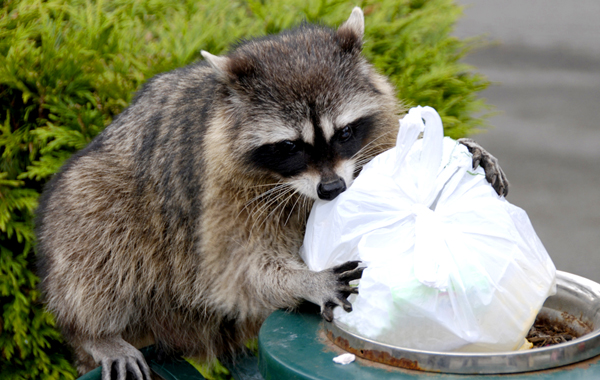Let’s All be Unstoppable Raccoons

“Some people are uncomfortable with the idea that humans belong to the
same class of animals as…raccoons. They’re like the people who become successful and then don’t want to be reminded of the old neighborhood.”
– Phil Donahue, Talk Show Host and Writer
Key: Raccoons embody crucial qualities needed to live an enjoyable life.
Living it: Learn from Raccoons’ example and overcome, be adventurous, learn fearlessly and never give up.
Clinical Concept: Grit, growth-mindset, resiliency and living outside our comfort zone as shown by Toronto’s (and my) favorite woodland scamp.
How do you feel when you buy something expensive and it totally doesn’t work? Disappointed? Fooled? Angry? What if you spent 31 million dollars and years of research and development? How would you feel then?
Inspired, of course.
That’s how many Toronto, Canada residents feel about the continued failure of their “raccoon proof” trash cans—as the city politicians dubbed them—the secret weapon in “what we like to call our ‘war’ against raccoons.” The war started over a century ago as humans began to urbanize larger swaths of woodland. Some animals faltered or fled. Raccoons rubbed their clever little hands, bandit-ringed eyes alight. This led to a near-constant nightly barrage of overturned trash cans which rose to the level of a city-wide health concern. Hence the enlistment of Rehrig Pacific and their specially designed trash can with “raccoon-resistant” lock. The manufacturer refuses to call them “raccoon proof,” with good reason.
Suzanne MacDonald, animal behaviorist, raccoon expert and “known raccoon sympathizer” was brought in during development of the lock to study the raccoons’ performance. She was not as optimistic since their hands are not built to turn the lock handle. “It’s physically impossible for them,” she said, after watching hordes of failures. “They won’t learn how to get in,” (Dempsey, 2018).

This is not the first time behaviorists have studied racoons. In fact, according to Dr. Michael Pettit, assistant professor of psychology at York University in Toronto, in the early 1900s, before the lab rat, the racoon was the preferred animal. The problem was that they were too smart. Controversially smart, in fact. Psychologist Lawrence W. Cole of the University of Oklahoma, and Herbert Burnham Davis at Clark University “published the results of nearly identical experiments on the processes of learning, association and memory in raccoons [that] independently concluded that raccoons bested the abilities of cats and dogs, most closely approximating the mental attributes of monkeys.” Cole’s research went a step farther, asserting that racoons were closer to humans in their capacity for independent thought, problem solving and potentially having actual ideas (2010).
While this assertion drew enough fire in 1910 to burn down raccoon research, the gleeful Torontonians of the 20th century who read the headline “It Took This Raccoon 30 Seconds to Break into a Raccoon-proof Green Bin!” may agree.The headline, one of many in Toronto newspapers, referenced video proof. This was great news to the skeptical raccoon expert. “I am firmly on team raccoon, I think that’s pretty clear,” MacDonald said. “So, I laughed when I saw the video. I thought it was kind of awesome.”
MacDonald has believed “that with every effort we make to thwart the raccoons, we may be helping to make them smarter, creating an uber-raccoon” even before the racoon-proof trash can project (Dempsey, 2018).
If human challenge is making an uber-raccoon, I say that we learn from their strengths and model them to build a better human.
How to be a More Raccoonish Human
“Because we don’t know what these raccoons are capable of and we know they’re highly intelligent.”
– Dennis Monestier, Rehrig Pacific Canadian sales manager answering Toronto Star Journalist Amy Dempsey’s question why the manufacturer won’t call the bins “raccoon proof.”

At KeithKarabin.com we’re all about living our most enjoyable life. That comes from learning and changing our own behavior. We don’t always have to learn from other humans; in fact, that’s rather arrogant. Here are some ways that these Canadian trash pandas (a some-what crass but well-earned nickname for raccoons) are frankly better than we are at living well.
Raccoons see change as opportunity. According to Dr. Pettit, way back when urbanization began “Raccoons had attracted interest because they flourished, rather than receded, in the face of human expansion” (2010). What would our lives be like if we approached small changes, let alone the destruction of our ecosystem, with a positive and flourish-focused mindset? We would not just survive a change, we would adapt and thrive, like raccoons.
Raccoons are adventurous. “I think the urban environment selects for certain types of raccoons, ones that are less afraid of people, more likely to investigate new things,” MacDonald said (Dempsey, 2018). Stepping out and trying new things is key to finding new joy, and to do it with the “cunning, mischief and curiosity” that early psychologists said “characterized the [raccoon] species” sounds like a blast! (Pettit, 2010).
Raccoons are fearless learners. As humans, our leaning and problem-solving is often wilted by fear of failure. This debility increases as we age. However, “the raccoon’s instinctual curiosity lay at the heart of Cole’s most startling claim: that the animal possessed ideas derived from complex forms of mental association” Dr. Pettit (2010) wrote, “a notable trait because it was a form of attention stripped of any utilitarian motive such as hunger or fear. It represented learning in its purest form.”

Raccoons never give up. It’s really that simple. In controlled testing MacDonald found no raccoons who could beat the lock. In the open city it took the first raccoon four months to crack it. But these city raccoons are the tough ones. “They don’t give up right away like rural ones do,” MacDonald said, “They keep at it,” (Dempsey, 2018). The city itself is the likely reason these raccoons excel; life is more challenging, and they rise to meet that challenge.
I believe that we can be more raccoonish humans, and I will try to be. I’m also on team raccoon and am now even more glad that they’re my favorite animal. If you visited my Ecotherapy pavilion at the Aware Fair in Doylestown, PA you might have seen my raccoon rock. I am also glad for Eric Barker who mentioned Toronto raccoons, all-be-it more briefly in Barking Up the Wrong Tree because he piqued my raccoonish curiosity which sparked this article.
But what about you? What is the problem in your life that seems specifically engineered to be you-proof? How can you beat it? Both Dr. Pettit—who asserted that “it is time to reconsider the raccoon’s exclusion from the discipline of psychology”—and Suzanne MacDonald are rooting for you. “I teach students, I love it when they do well,” MacDonald said. “It’s the same for raccoons. I like to see individuals succeed, regardless of their species,” (Dempsey, 2018).
Let’s go be raccoons today and let the world be ready for our mischief.

Dempsey, A. (2018) Toronto built a better green bin and—oops—maybe a smarter racoon. Toronto Star. Retrieved from: https://www.thestar.com/news/gta/2018/08/30/toronto-built-a-better-green-bin-and-oops-maybe-a-smarter-raccoon.html
Pettit, M. (2010) Raccoon intelligence at the borderlands of science. American Psychological Association. Retrieved from: https://www.apa.org/monitor/2010/11/raccoon

 Previous Post
Previous Post Next Post
Next Post